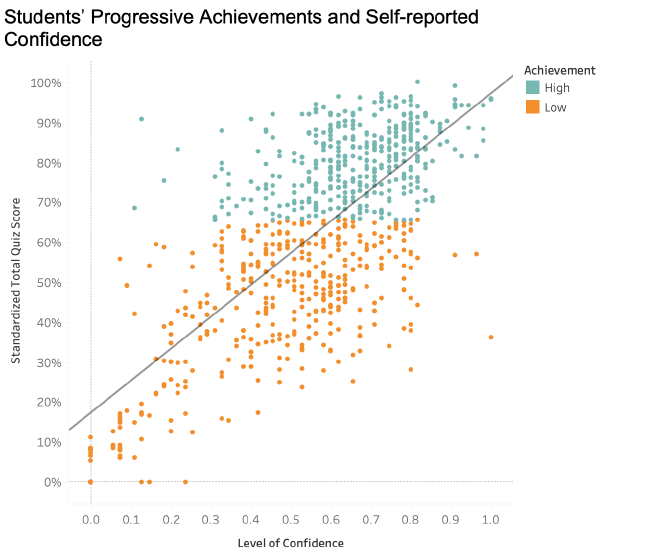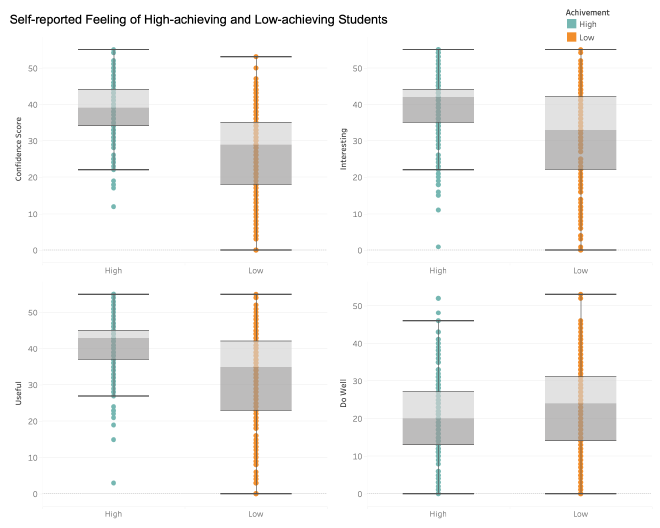STEM education is crucial, but many students struggle to find a personal connection to science, leading to a lack of motivation in STEM-related studies (Franks and Capraro, 2019). Introductory courses aim to build student confidence and foundational skills to foster interest and career development in STEM fields. CourseKata, an initiative founded in 2017 by learning scientists at two major public universities in California, focuses on teaching introductory statistics and data science through an interactive online textbook.
Research Focus#
Using data from the 2021 CourseKata dataset, we evaluated 895 students who completed a 10-week course. Students engaged with online textbook chapters weekly before lectures, with each chapter including a quiz and a self-survey (pulse check). Quizzes assessed concept understanding, while pulse checks gauged students’ feelings about their learning.
Key Findings#
Confidence and Quiz Scores#

The graph above shows that students’ confidence was highest in the second chapter (3.86) but decreased to 2.99 by the course’s end. Confidence began to drop in the third chapter (3.31), suggesting the need for curriculum improvements or additional teaching resources for that chapter. Students’ average scores also declined from 0.85 in the first chapter to 0.57 in the eleventh chapter.
This trend highlights the critical role of early success in maintaining confidence. Initial high confidence levels may be attributed to introductory material being less challenging, thereby boosting students’ self-assurance. As the course progresses and material becomes more complex, confidence wanes, reflecting the increasing difficulty and possibly insufficient support or resources to help students adapt.
Confidence and Academic Performance#
Research indicates that confidence is a significant predictor of academic achievement (Lazar et al., 2014). Our analysis found a statistically significant positive correlation between higher quiz scores and higher confidence levels (t(df=4407)=26.19, p<.001). This suggests that as students feel more confident, they are likely to perform better academically.
Confidence influences several aspects of learning. Students with higher confidence levels are more likely to engage actively in their studies, utilize available resources, and persist through challenges. This engagement and persistence directly translate into better performance on quizzes and other assessments.
Insights from Self-Surveys#
We created metrics to understand the relationship between students’ achievements and their self-reported feelings of confidence, usefulness, interest, and ability to do well in the course.
For high-achieving students, the distribution of feelings was narrower. A notable gap was seen in confidence, followed by interest and usefulness, with the smallest gap in the ability to do well, as this question was phrased differently. This consistency among high achievers suggests that confidence and interest in the material significantly impact academic performance.
Recommendations#
Enhancing Confidence: High confidence correlates with higher quiz scores. Instructors should provide positive feedback to boost confidence, especially for high-performing students with lower confidence levels (11% of high achievers). Recognizing and celebrating small successes can reinforce students’ belief in their capabilities.
Support for Low Achievers: Instructors should focus on low-achieving students, particularly those with low confidence. Additional office hours and emotional support can help build their confidence and improve performance. Tailored interventions, such as personalized feedback and targeted support, can address individual challenges and promote a growth mindset.
Conclusion#
Confidence plays a crucial role in STEM education. Our findings suggest that boosting student confidence can lead to better academic performance. Confidence not only enhances engagement and persistence but also fosters a positive attitude towards learning, which is essential for long-term success in STEM fields. Further research could explore the feedback loop between performance and confidence to better support STEM learners. By understanding and addressing the factors that influence student confidence, educators can create a more supportive and effective learning environment.
References#
- Franks, A. D., & Capraro, M. M. (2019). Motivated for STEM: Developing an Understanding of Highly Motivated Students’ Self-Concept in STEM Education, 27(1), 11.
- Stankov, Lazar, & Morony, Suzanne, & Lee, Ping. (2014). Confidence: The best non-cognitive predictor of academic achievement? Educational Psychology, 34. 10.1080/01443410.2013.814194.